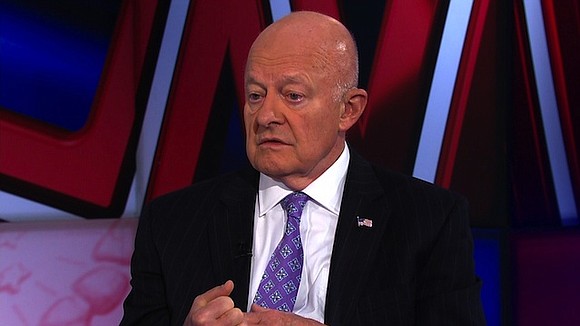Clapper: US Institutions 'Under Assault' From Trump
CNN/Stylemagazine.com Newswire | 5/15/2017, 8:07 a.m.
By Eli Watkins
CNN
WASHINGTON (CNN) -- Former Director of National Intelligence James Clapper said Sunday that he thinks US institutions are under assault from President Donald Trump.
"I think in many ways our institutions are under assault both externally -- and that's the big news here is the Russian interference in our election system -- and I think as well our institutions are under assault internally," Clapper told anchor Jake Tapper on CNN's "State of the Union."
Pressed if he meant US institutions were under assault internally from the President, Clapper responded, "Exactly."
Clapper called on the other branches of the federal government to step up in their roles as a check on the executive.
"The founding fathers, in their genius, created a system of three co-equal branches of government and a built-in system of checks and balances," Clapper said. "I feel as though that is under assault and is eroding."
Democrats and several Republicans in Congress have publicly mulled pressing the Department of Justice to appoint a special prosecutor or establishing an independent investigative body that could look into allegations of potential collusion between Russia and the Trump campaign in what the US intelligence community says was Moscow's efforts to influence the US election.
The Senate must confirm a new FBI director once Trump names a candidate; that FBI director will take a lead role in the Russia investigation.
Utah Republican Sen. Mike Lee advocated on "Fox News Sunday" that Trump appoint Judge Merrick Garland to head the FBI. Josh Holmes, a former aide to Senate Majority Leader Mitch McConnell, said later on the program that the Republican leader had just called him to say he would support Garland for FBI's top spot.
Garland was President Barack Obama's pick to replace Supreme Court Justice Antonin Scalia after Scalia's death last year. If appointed and confirmed as FBI director, Garland's appointment would create a vacancy on the US Circuit Court of Appeals for the District of Columbia, which has jurisdiction over the DC area and federal agencies, making it one of the highest legal authorities in the country short of the Supreme Court.
Can't refute or confirm collusion questions
Clapper also said Sunday that the President and the White House are wrong to cite Clapper's previous Senate testimony on the questions about alleged collusion between the Trump campaign and Russia as proof that no such collusion exists, emphasizing that no one should portray his comments as "exculpatory" -- something Trump has done repeatedly on Twitter.
"The bottom line is I don't know if there was collusion, political collusion," Clapper told Tapper. "I don't know of any evidence to it. So I can't refute it, and I can't confirm it."
Clapper told NBC in March that he didn't know of any evidence that demonstrated collusion between Russia and the Trump campaign. At a Senate Judiciary subcommittee hearing earlier this month, Clapper clarified that statement, saying he was also unaware of the FBI's investigation into the matter until Comey made it public in March.
At that subcommittee hearing, former acting Attorney General Sally Yates, whom Trump fired in January for refusing to defend his initial temporary ban on visitors from several Muslim-majority countries and suspension of the entry of Syrian refugees, declined to answer the question of whether there was evidence of collusion publicly; in her answer, she also noted that Clapper had been unaware of the FBI investigation.
Clapper said Sunday that his "standard practice" as the leader of the intelligence community during the Obama administration was to defer to the FBI on any counterintelligence investigations.
He noted the intelligence community's joint assessment declaring Russia had interfered in the 2016 election did not contain any reporting about political collusion.
"I did not have any evidence," Clapper said, again noting he was unaware of the executive branch investigation into allegations of collusion.
Comey and Trump
On Friday, Trump raised eyebrows by tweeting a warning to Comey, whom he fired unexpectedly on Tuesday, about leaking information to the media, saying he "better hope that there are no 'tapes' of our conversations before he starts leaking to the press."
In his news briefing later that day, White House press secretary Sean Spicer declined repeatedly to explain what the tweet meant or address questions about whether there were recording devices in the Oval Office.
Trump and Comey had a private dinner in the White House on January 27 in which a source close to Comey said the President asked the FBI director to pledge his loyalty, which Comey, who reportedly was taken aback by the request, refused to do.
The dinner was on the same day that Yates went to the White House to warn the administration about since-ousted national security adviser Michael Flynn's potential vulnerability to Russian blackmail and that Trump issued the executive order restricting travel from several majority-Muslim nations.
Clapper said Sunday that he spoke with Comey prior to the dinner while at an event at FBI headquarters in Washington.
"He mentioned to me the invitation he had from the President for dinner," Clapper said. "He was -- my characterization -- uneasy with it both from the standpoint of the optic of compromising his independence and the independence of the FBI."









